IN ENGLISH
Games around hydropower plants
Objavljeno prije
14 godinana
Objavio:
Monitor onlineWeekly Monitor, 1 October 2010
Games around hydropower plants
The top authorities’ battle to build hydropower plants on the Moraca River is entering its final phase. This is obvious from the sharp tones of Prime Minister Milo Djukanovic and his economic guru Veselin Vukotic. “Decisions on development of new energy sources must be made quickly and resolutely because, otherwise, energy can become a major barrier to development. This requires the use of foreign investment and domestic resources, “said the Prime Minister at the Milocer conference.devoted to energy and development. Clearly: we have a fast river, the foreign investor money and that’s power. The details – how much and/or who will benefit from that business and what will happen to the environment – we will find out, I guess, when it’s too late. As has happened with the Aluminium Combine and the Steel Plant. The Prime Minister has pointed his finger at those who question the whole business: “The less compentent the part of the society, the more interested and impassionate it is for participating in discussions about which it knows very little. In Montenegro, everybody is an expert in energy, in environment, in everything”. Those who had complaints, criticisms or questions related to the construction of hydropower plants on Moraca would now probably need to shut up. And that, at a crucial moment. In the midst of public hearings on the Draft Concession Act, one of the key documents for decisions on the use of the Moraca River hydropower potential. Less Democracy: Professor Veselin Vukotic joined in the crackdown on useless critics: “In the field of development decisions, there should be more meritocracy than democracy. It must be more the rule of knowledge and vision, as opposed to ignorance and speculative expectations. Power industry is a good example of our speed in decision making – the discussion on construction of hydropower plants has lasted 30 years, “said Vukotic. And he regrets that we still don’t have them. “It is not true that fruitless discussion on hydropower development is on for 30 years and that this is delaying their construction” said for Monitor Dejan Mijovic, Forum 2010 Coordinator for Economic Policy and Entrepreneurship. He explains that during this period former and current authorities launched four tenders for these plants, but none succeeded because no one wanted to finance the project. “That something is wrong with the project’s economic and commercial viability, proves recent statement of Vuk Hamović, owner of EFT, the largest regional trader and investor in the energy sector, who is certainly not uninformed ” Mijovic
explains. Hamović said recently that his firm’s analysis showed that Moraca power project has “certain commercial weaknesses” which prompted EFT to withdraw from the project. Who is useless: Darko Pajovic, Executive Director of NGO Green Home, says that after everything that happened in recent months with documents needed for the construction of four hydros, the Prime Minister should be well aware who actually doesn’t know his job. “The real address where knowledge and skills should be checked are Djukanovic’s associates. Those who adopted the bad and wrong documents, spent peoples’ money, time and energy. From all this follows that they are the ones who do not know their job. ” Pajovic adds that after all these worthless documents, we have now obtained the draft Concession Act, which is – disappointing. “Whenever we sought clarifications on previous documents, people from the government claimed that they will all be provided in the Concession Act. Unfortunately, it is now clear that the document does not contain a single key answer. Forum 2010 claims that the document is not in accordance with the Law on Concessions: “The published Draft Concession Act for Hydropower Plant Development on the Moraca River is incomplete, which represents a gross violation of the Law on Concessions and undermines the public debate on this crucial document, on the basis of which the tender concession should be launched. ” And that is not the only flaw. Forum 2010 has compiled a number of shortcomings of this key document – it is not clear how much the project will cost taxpayers, even though the law explicitly requires that this figure be stipulated. The draft Concession Act does not contain the amount of state participation in the project, which was estimated to be in the range of several hundred million euros during the recent debate on the Draft Spatial Plan (DPP) and Strategic Environmental Impact Assessment (SEA) for Moraca River Basin”. Also missing is the analysis showing whether the planned concession secures public interest, value for money, and the balancing of risks between the grantor and the concessionaire. Although its inclusion is mandatory, the text of draft concession agreement between the grantor and the concessionaire is not attached. The document only lists the main chapters that the concession agreement should include, but these chapters are already defined in the Article 43 of the Law on Concessions in greater detail than in the Draft Concession Act. Enigma upon enigma Although the Government repeatedly announced overl last several months that Draft Concession Act will address many unknowns – the document does not list the necessary measures to protect the environment and achieve energy efficiency. It is expected – that these will be proposed by the future concessionaire! “Too much space and too many options have been granted to the concessionare to decide on such important matters” said Darko Pajovic. He explains that this confirms NGO community’s
assessment that Montenegrin energy sector is being managed by interest groups, rather than by the government. “Energy resources will not be created or used by Montenegro or its citizen, but by interest lobbies, “said Pajovic. Furthemore: “cost benefit analysis on the basis of which economic benefits and environmental impact of proposed technical solutions project could be estimated has not been performed, which makes the process non-transparent. ” Dejan Mijovic says that it is most distressing to see how little, if any, respect there is for professionalism, the public at large and the recently adopted European laws. The Law on Concessions, for example, has been prepared after several years of expert support granted by the European Union, USAID, GTZ, OECD and World Bank, and adopted after consultations with the European Commission, ” reminds Mijovic. But it is not enough to have a good European law. It should be applied, as well. What are the effects: Huge fees have been paid with taxpayers money to international consultants for preparation of the project documentation. Nonetheless, the recently established Mediterranean University has been retained to assess the economic effects of hydropower development. “This analysis and the basic parameters on which it is based was not published, so it is impossible to conduct a qualified discusssion on the economic effects of the power plant construction. However, from the reported results, one can already conclude that the analysis has exaggerated economic benefits and fully ignored the cost aspect, ie. negative consequences on the population and environment “, claims Forum 2010. Over the next days, all shortcomings of the Concessionary Act will come to the surface. But Forum 2010 warns that results of the earlier held public debate on SEA and DPP have still not been published. No explanation has been provided why the Technical solution I (high Andrijevo Dam) has been kept, despite numerous complaints heard during the public debate denied its validity. The concessionaire will have the freedom to propose in the bid his own technical variants that suit him. Forum 2010 notes that, pursuant to law, any new variant must undergo a public hearing before the tender. Criteria for evaluation of project bids are listed summarily, without specifying their relative weights. However, it is clear from the text that project bids will be evaluated on the basis of their respective energy contributions, which favors projects with greater number of large hydropower plants, regardless of their adverse impact on the population and the environment, explains Forum in its statement. Moraca Roads and Sides: Forum 2010 also claims that the estimated relocation of the existing Moraca highway has been significantly reduced without any explanation. In addition, instead of 100 km of new local roads that government representatives recently promised during the public debate, only 20 kilometers of local roads will be built in the Basic technical solution I, and 27 km
in the Basic technical solution II. Things are not easy for Djukanovic and his professionals. In their document, the minimum and maximum duration of the concession are not specified in accordance with Article 19, paragraph 3 of the Law on Concessions. Thus the possibility for a concession period longer than 30 years has been opened, which confirms experts’ doubts in the economic viability of the proposed concession. “Therefore, and bearing in mind that the duration of concessions of up to 30 years is determined by the Government, and the longer term concessions by the Parliament of Montenegro, the proposed Draft Concession Act would have to be reviewed and approved by the Montenegrin Parliament”, concludes Forum. However, Veselin Vukotic would not have it that way. He would give the government a free hand. No one should be allowed to mess up with them now that they are so close to the goal. And so many times to date, they have proved that they just know how to get there.
Marijana BOJANIĆ
Komentari
IZDVOJENO
IN ENGLISH
Government Summons Ambassadors for Consultations and Instructions: A Foreign Policy Tightrope
Objavljeno prije
1 sedmicana
12 Aprila, 2025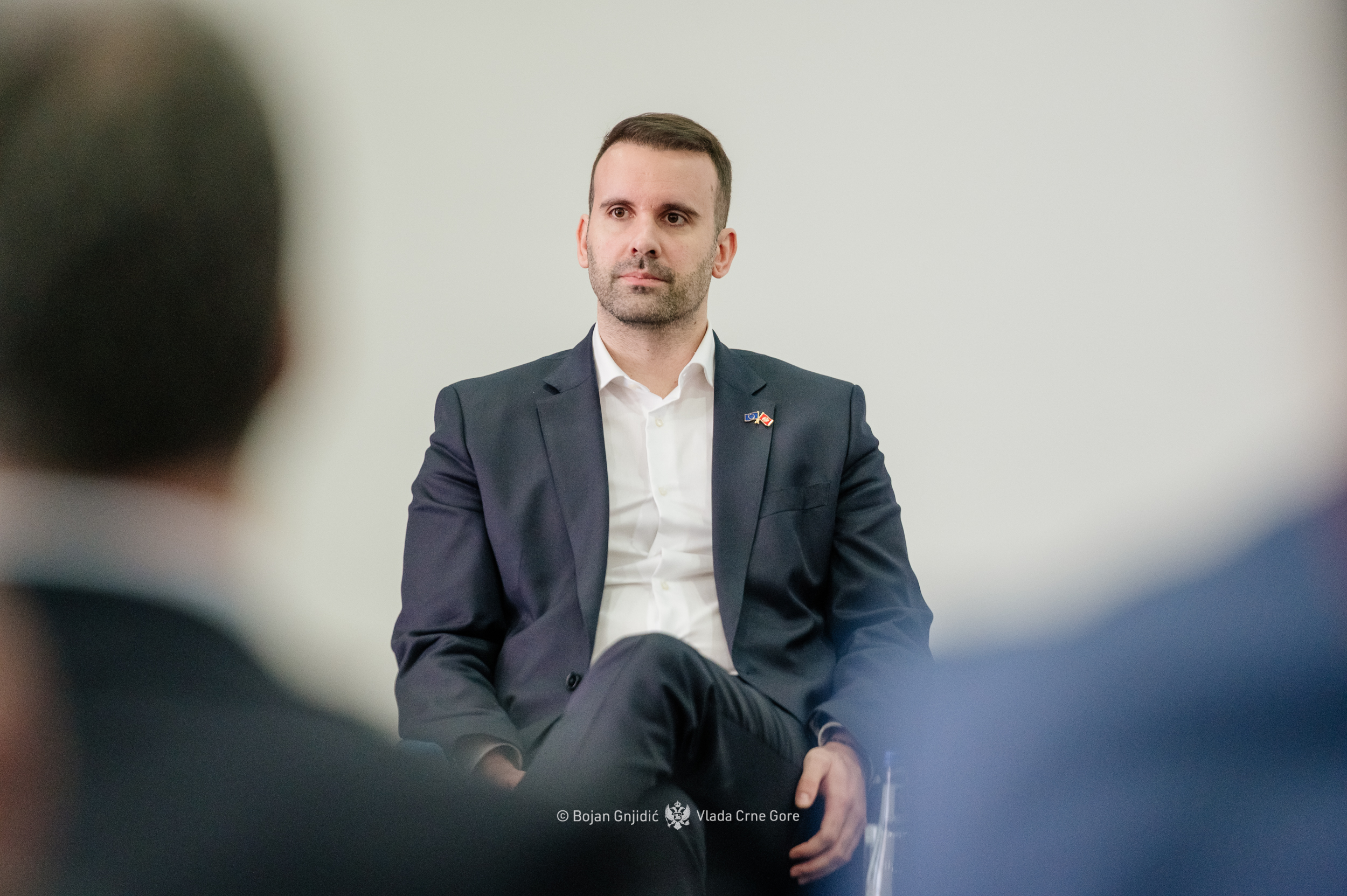
Prime Minister Milojko Spajic recently held a series of individual meetings with Montenegrin ambassadors—from Ukraine to Europe to the United States. Informal sources within the government say that during these meetings, the Prime Minister outlined a new geopolitical landscape shaped by Donald Trump’s return to power in the U.S. and evolving dynamics with the European Union
At the end of February, the Ministry of Foreign Affairs (MFA), led by Minister Ervin Ibrahimovic, summoned nearly all Montenegrin ambassadors stationed in Europe and the U.S. for urgent consultations, set to begin on March 6. The move sparked anxiety among some diplomats, who feared a repeat of the events of November 15, 2024, when three ambassadors were abruptly dismissed.
Monitor finds out that Spajić met separately with key diplomats, including Ukraine-based Borjanka Simicevic and U.S.-based Jovan Mirkovic. However, the concerns of mass dismissals proved unfounded. Instead, sources say the Prime Minister emphasized Montenegro’s continued commitment to the EU and instructed ambassadors to maintain a clear, pro-European stance. At the same time, he advised them against making any public criticisms of the United States or commenting on current rifts between the U.S. and its European allies.
Montenegro’s calibrated position became evident on March 11 at a meeting of top European military officials in Paris, where strategies for supporting Ukraine were discussed following Washington’s announcement of a suspension in military aid. The U.S. was not invited to the Parish meeting as the European leaders were keen to show they could step up independently if needed. Though an AP report initially stated that only Montenegro and Croatia, among NATO’s European members, failed to respond to the invitation, the Prime Minister’s Security and Defense Advisor, Todor Goranovic, told Radio Free Europe (RFE) that Montenegro would indeed participate. However, only the deputy military representative to NATO in Brussels attended because “Chief of General Staff Zoran Lazarevic was officially visiting Bulgaria at the time” – Goranovic explained.
Meanwhile, dissatisfaction is growing within Montenegro’s ruling coalition over Ambassador Mirkovic’s performance (or the lack thereof) in Washington. Tensions reportedly flared after a mid-February meeting with U.S. officials where he suggested that the fall of Serbian President Aleksandar Vucic could weaken some of his Montenegrin puppets. The details of the aforesaid meeting could not be independently confirmed. The subsequent report sent to Podgorica reportedly angered Spajic’s coalition partners from the former Democratic Front (DF). Although the DF was not directly mentioned in the report, its officials saw themselves as being referred to by the ambassador. One of them even retorted that those remarks would be a ground for the ambassador’s recall.
Discontent also emerged from the opposite ideological camp. Metropolitan Boris of the Montenegrin Orthodox Church (MOC) sent a protest letter to Minister Ibrahimovic, complaining that the embassy in Washington did not engage with the MOC delegation during their visit. The embassy, he wrote, failed to meet with them or assist in organizing meetings with U.S. officials. Furthermore, Metropolitan Boris complained that the embassy was “ignorant of some names and institutions that we wanted to reach out to”. He directly blamed the ambassador for the embassy’s dismissive stance.
As Monitor has previously reported, the embassy in Washington is increasingly out of sync with developments in the U.S. The once-prominent Montenegrin Caucus in Congress, which boasted 42 members under former ambassador Srdjan Darmanovic, has effectively dissolved. It’s now reduced to a single member—Congresswoman Chellie Pingree from Maine. Darmanovic had successfully lobbied to counter opposition to Montenegro’s NATO membership, despite concerns over ties of the Djukanović government with foreign criminal networks and Russian intelligence services.
Pingree reportedly sent multiple letters to the embassy criticizing the lack of engagement, but received no response. Monitor also reached out to her office twice for comment but had not received a reply at the time of publication.
Diplomatic affairs aren’t running smoothly in Europe either. In late January, the government approved the appointment of 14 new ambassadors. The list was coordinated with President Jakov Milatovic, whose signature is required for the appointments. Opposition parties and members of the pro-Serbian bloc raised objections, particularly over the inclusion of figures associated with the long-ruling Democratic Party of Socialists (DPS) and former foreign minister Milan Rocen.
One such appointee is Dragana Radulović, a longtime diplomat and former advisor to Prime Minister Dusko Markovic. She was posted to New York as Montenegro’s representative to the UN. She has been in diplomacy since 2000. Internal sources indicate that Veljko Milonjic initially hoped for the post in New York but was instead sent to Warsaw. Milonjic is remembered for his involvement in the so-called “cocaine affair” of 2015 when he was the head of Montenegro’s consulate in Munich. A truck from Munich carrying drugs under diplomatic seal was intercepted at the Austrian border. Though the Ministry of Foreign Affairs denied direct involvement, the incident cast a long shadow. Milonjic denied wrongdoing but was quietly recalled while the Consulate General in Munich was closed down. Milonjic was later appointed to a senior diplomatic post despite the scandal never being prosecuted. The truck driver, Sasha Mugosha, was sentenced to six years in prison. He was released after serving two and a half years and deported to Montenegro.
In March, the government announced that former German Bundestag member Holger Haibach had been appointed as a senior special advisor to Prime Minister Spajic, beginning January 1. Haibach will advise on regional relations in the Western Balkans and support EU accession efforts. His services will be funded by Germany’s Center for International Peace Operations (ZIF). While Haibach’s selection followed a public hiring process, sources in the diplomatic community question his current influence in Berlin. Haibach, a former CDU member of parliament, left office in 2011. Meanwhile, Veljko Kustrov, a Herzegovinian with close ties to Spajic, is considered his main point of contact in Germany.
Perhaps the most controversial diplomatic appointment so far is that of Dusanka Jeknic, a figure from the 1990s linked to the Djukanovic regime and repeatedly associated with cigarette smuggling. However, the Italian prosecutors could not present sufficient evidence against her in court. Jeknic was assigned to the embassy in Turkey after President Milatovic purchased property from her in Podgorica. Milatovic later claimed he had not been consulted on her appointment, stating that such decisions were under the MFA’s jurisdiction. He emphasized that his property purchase had been properly reported to Montenegro’s Agency for the Prevention of Corruption.
Previously, Milatovic had criticized the appointment of Predrag Drecun to lead Montenegro’s Investment Development Fund because of his close ties to the Djukanovic regime.
Montenegro is yet to drive a long and bumpy road before it gets a professional diplomatic network.
Jovo MARTINOVIĆ
Komentari
IN ENGLISH
TWILIGHT OF MONTENEGRIN INTERESTS IN AMERICA: Prayer Breakfast Instead of Real Diplomacy
Objavljeno prije
1 sedmicana
12 Aprila, 2025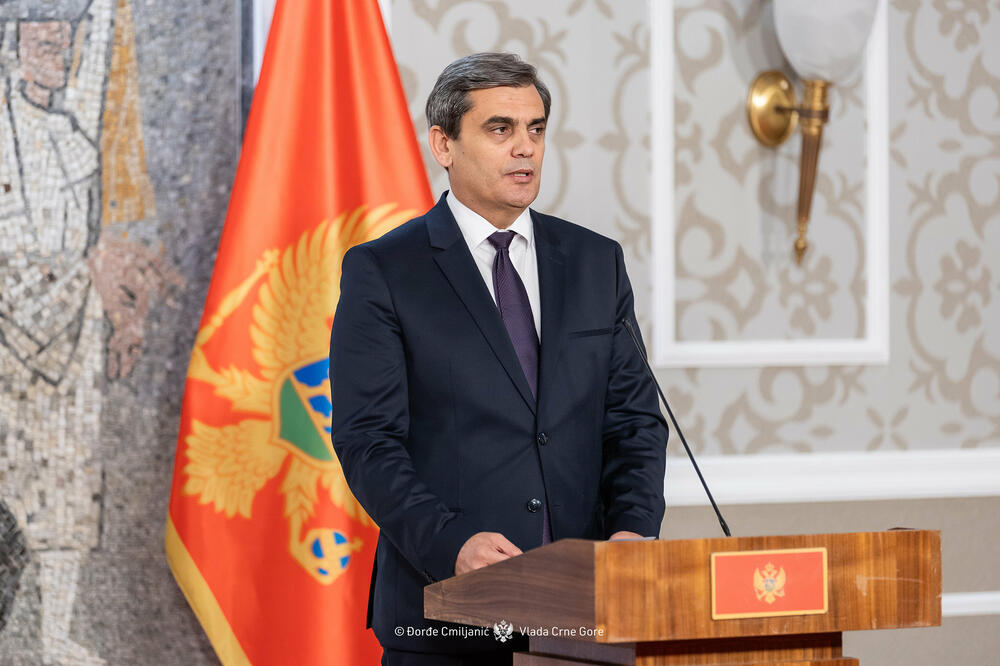
Aside from occasional trips and engagements with diaspora organizations, Montenegro shows little sign of having a coherent lobbying strategy in the United States. With the retirement of Congressman Doug Lamborn, the Montenegrin Congressional Caucus has dwindled to just one representative: Congresswoman Chellie Pingree from Maine
The 73rd annual National Prayer Breakfast in Washington recently took place, drawing more than three thousand leaders and prominent figures from politics and civil society from around the globe. Over the course of two days, participants had opportunities to network and exchange ideas at the Hilton Hotel, under the official patronage of the U.S. President.
Invitations were extended to a broad range of Montenegrin officials, including Prime Minister Milojko Spajic, Foreign Minister Ervin Ibrahimovic, Deputy Prime Minister for Economic Policy Nik Djeljoshaj, Minister of Urban Planning Slaven Radunovic, Minister of Transport Maja Vukicevic, and Minister for Human and Minority Rights Fatmir Djeka. Parliamentary invitees included many MPs, both from the opposition and the majority. Former President Milo Djukanovic and his close aide Branimir Gvozdenovic received invitations as well as several other ex officials. Also in attendance was Vijesti columnist and co-founder Zeljko Ivanovic—reportedly the only one whose travel wasn’t funded by taxpayers.
Branimir Gvozdenovic is often featured in pro-DPS (Democratic Party of Socialists) media as a regional liaison for the Prayer Breakfast. However, his name is absent from the official records of the event’s organizing foundation. Meanwhile, the Montenegrin delegation was accompanied by support staff including security, administrative personnel, and translators — necessary, since only Minister Vukicevic speaks fluent English. Translation was required for Djukanovic, Gvozdenovic and most MPs.
The cost of attending the Prayer Breakfast—including registration fees, three nights in a hotel, airfare, and daily allowances (currently €112 per day) — typically totals around $3,000 per person. When accompanying staff is added, the total bill reaches into the tens of thousands of euros. Out of the entire group, only Ministers Ibrahimović and Djeka were scheduled for official meetings at the U.S. State Department.
Minister for the Diaspora Adem Azemovic, representing the Bosniak Party, made his second trip to the U.S. in a month, accompanied by two associates. In late December, he met with Naser Nika, head of the Albanian-American Association of Staten Island. After the New Year he returned to meet him again. When asked why a second meeting was necessary, the Ministry explained that the first encounter had been brief, and the second was based on an official invitation. The association, which includes Albanian Montenegrins living in Staten Island, was praised for promoting Montenegro in New York.
Azemovic also visited the New York State Assembly, which is reportedly considering hosting Montenegro’s Independence Day celebration. His office described this as an opportunity to mark one of the country’s most significant holidays in a high-profile setting. Interestingly, Montenegro’s Independence Day was already celebrated at New York City Hall on May 23, 2024, in an event organized by the Albanian-American Association of Ulcinj. That celebration included Montenegro’s Consul Amer Cikotic and the Association’s president Dzelal Lanica. Nika had publicly criticized the event on Facebook, claiming that it misrepresented interethnic relations in Montenegro and highlighted Serbian political influence via Serbian President Vucic-backed factions.
Despite these diaspora engagements, there is little to suggest that Montenegro has any serious lobbying efforts in Washington—particularly with key decision-makers. Nebojsa Medojevic, leader of the Movement for Change (PZP), remarked that “Montenegro simply failed to grasp the magnitude and significance of political changes occurring in the U.S.”
“The current ambassador —Professor Jovan Mirković is openly anti-Trump and a personal ally of Aco and Milo Djukanovic” Medojević stated. “He has no meaningful contacts in Washington and no ideological alignment with the current direction of U.S. politics, so it’s unclear who or what he’s even representing.” He went on to question the competence and professionalism of the current government’s foreign policy team.
Interestingly, Nebojsa Todorovic, the former chargé d’affaires in Washington, had warned the Ministry of Foreign Affairs (MFA) and the government in late 2023 to prepare for a potential return of Donald Trump.
Since arriving in Washington in mid-September, Ambassador Mirkovic has maintained a notably low profile. His biography reveals he spent several years in Russia during the early 1990s—the same period when Milan Rocen was serving as minister-counselor at the Yugoslav embassy. Sources claim that Mirkovic has family ties in Russia and is known for his longstanding loyalty to the Djukanovic regime. Neither Djukanovic nor his Democratic Party of Socialists (DPS) have ever renounced their 2011 strategic cooperation agreement with Putin’s United Russia. In fact, the DPS publicly reaffirmed its pride in these ties in Parliament last year.
With the departure of Doug Lamborn—one of the Montenegrin Caucus’s co-chairs—the group now counts only a single member: Congresswoman Chellie Pingree. Meanwhile, Serbia has been actively growing its influence. Foreign Minister Marko Djuric, a former ambassador to Washington, has built up the Serbian Caucus to nearly 40 members. Djuric even boasted that Serbia, though not a NATO member, has stronger U.S. ties than Montenegro.
Some claim that Serbia pressured Podgorica through influential regional businessmen into sending a low-impact figure to Washington. The contrast with past Montenegrin diplomacy is stark: Under Ambassador Srdjan Darmanovic, the Montenegrin Caucus had grown to 42 members, surpassing even the Albanian caucus. Darmanovic worked closely with Congressman Mike Turner to gain U.S. support for NATO accession—despite Djukanovic’s regime then-notorious links to organized crime and Russian intelligence services.
Efforts to revive the caucus were briefly relaunched by Nebojsa Todorovic, who during his stint as chargé d’affaires in 2023 helped re-engage 10 U.S. lawmakers, including Turner and other influential committee chairs such as Michael McCaul and Robert Aderholt. For a brief period, Montenegro held a unique status in the Balkans, with three Congressional committee leaders in its caucus.
However, Todorovic has since been recalled, and with him, much of Montenegro’s presence in Washington has faded again into inertia.
This raises uncomfortable questions: Is Spajic’s government reverting to the old practice of conducting diplomacy through informal channels and business networks, as seen under Djukanovic and his top advisor Rocen? At the time, oligarchs like Oleg Deripaska and other Putin loyalists were reportedly enlisted to lobby for Montenegro in the West.
That line of approach came at a steep cost to the country—and its reputation.
Jovo MARTINOVIĆ
Komentari
IN ENGLISH
2BS FORUM IN KGB HOTEL: Atlantic Council of Montenegro – who and what it represents?
Objavljeno prije
5 mjesecina
7 Novembra, 2024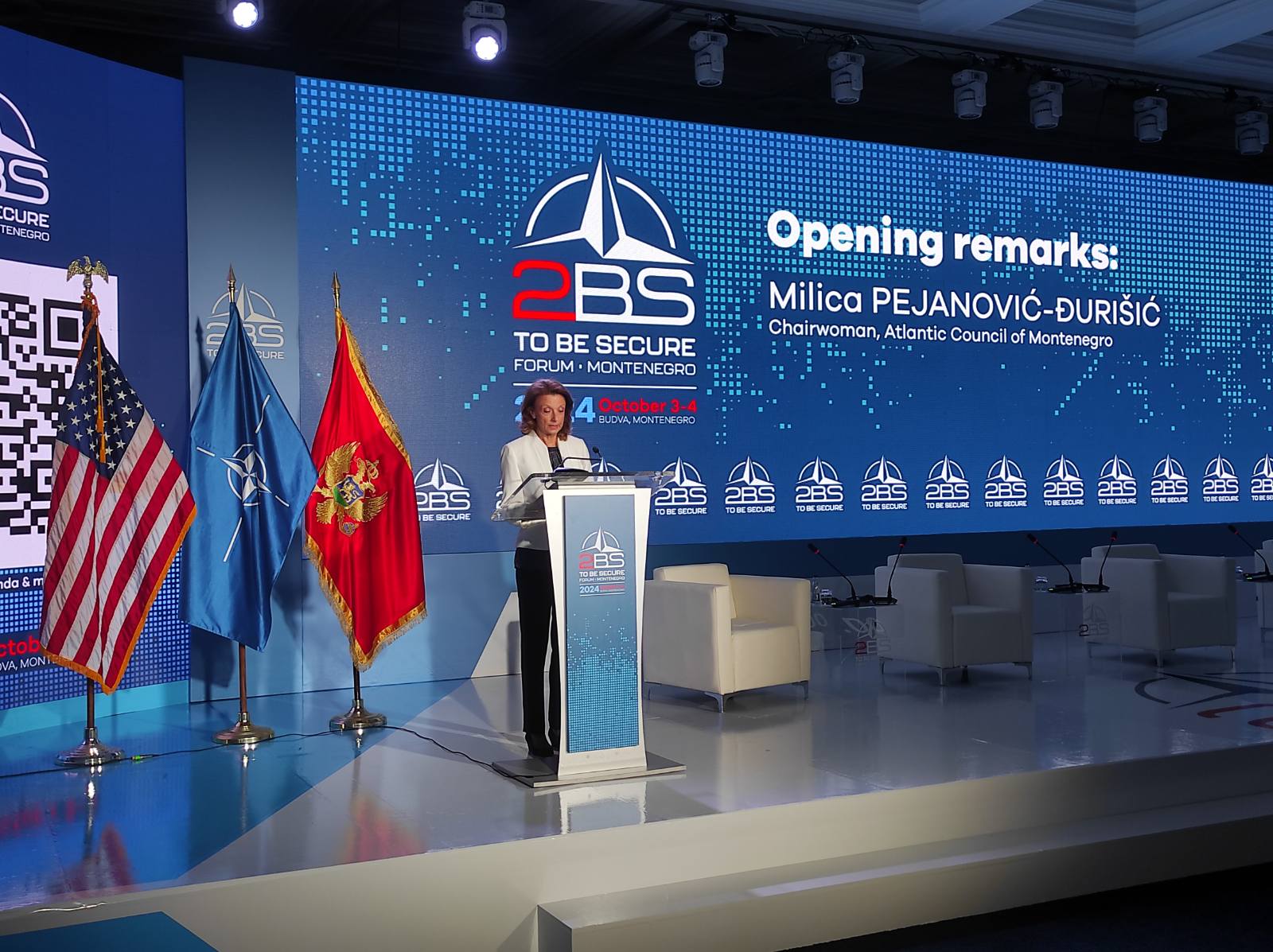
The current ACM chairperson is Milica Pejanovic – Djurisic, a long-time official of the once ruling DPS, former minister of defence and a reputable senior diplomat. The activities of the ACM are realised through three centres of which the Digital Forensic Center (DFC) comes to the fore. DFC was founded in 2018 and has released a number of publications on Russian malign influence, mainly from the view point of DPS
Last week (3-4 Oct) the 14th To Be Secure Forum Montenegro (2BS) took place in Hotel Splendid in Becici – Budva, under the auspices of the Atlantic Council of Montenegro (ACM). Its website states that 2BS is a leading politico – security conference in Southeast Europe. This year’s topic is World in Disorder: Turning Adversity into Opportunity with a focus on the repercussions and security challenges in the Western Balkans.
The event brought together more than 400 participants including government officials, high-ranking representatives of international organisations and diplomatic missions, and prominent experts in security and international relations. ACM points out that “it has devoted itself to the promotion of Euro-Atlantic values and international security since it was founded in 2006”. In the same year, the ACM became a member of the global Atlantic Charter Association (ATA).
The current ACM chairperson is Milica Pejanovic – Djurisic, a long-time high official of the Democratic Party of Socialists (DPS). She was also a Minister of Defence and a reputable senior diplomat. The ACM activities are carried out through 3 centres, of which the most exposed is the Digital Forensic Center (DFC) founded in 2018. DFC has released a number of publications on the subject of Russian malign influence, mainly from the view point of DPS. Allegedly, the DFC was founded in order to “fight against disinformation, fake news and propaganda campaigns aimed at destabilising democratic processes in Montenegro and the Western Balkans.”
The founder of the 2BS Forum and the DFC is Savo Kentera from Budva. He chaired the Montenegrin Atlantic Council from 2008 until May 2022, when the minority government of PM Dritan Abazovic (supported by DPS in the national assembly) appointed him to head the National Security Agency (NSA). Mr Kentera lasted little less than 5 months. As soon as the 12th 2BS Forum in Becici was over, he was sacked by the government following the DPS termination of support to Abazovic after he signed signed the controversial Concordat with the Serbian Church (SOC). Prior to his sacking Mr Kentera launched an NSA operation against Russian spy network, allegedly in cooperation with international partners and the Special Prosecutor’s Office (SPO). Two Montenegrin citizens were arrested, 6 Russian diplomats were expelled, and 28 foreigners were barred from entering the country.
However, the whole operation turned out to be a farce. Eventually, the two Montenegrins were not accused for espionage. Only one was suspected for illegal possession of weapons. No trial has ever taken place.
It is worth noting that the 2BS Forum founder (who claims that he supports Euro-Atlantic values) for many years chose the same hotel for the conferences. The founder of Hotel Splendid and its majority owner is now late Viktor Ivanyenko – retired director of the infamous KGB. During his term under President Boris Yeltsin, the service changed its name to the Federal Security Service (FSB). How a state employee and the chief of spies of the Russian Federation (and with money of dubious origin) came to own 4 hotels on the Montenegrin coast was never a reason for any concern, let alone inquiry, while the country was led by so-called pro-western Milo Djukanovic.
The Russian president Vladimir Putin (who was also at the helm of FSB following Ivanyenko’s retirement) said in 2004 that “ there is no such thing as a former KGB man”. The hotel is known as a meeting place of Russian intelligence and foreign and local business people and/or criminals. One of them, very close to Djukanovic, was put on the US Treasury’s blacklist, while another of his buddies is now under the protection (from going to prison) of Aleksandar Vucic.
Not only politicians and criminals have links with the Russian intelligence. In the aforesaid hotel on 24 May 2022 the then head of the Montenegrin Church (MOC) Miras Dedeic (The Rt Rev. Mihailo) met with a GRU (Main Intelligence Directorate) colonel Leonid Malofeyev. After a 5-hour meeting the two were photographed together. Mr Malofeyev, whose photographs with the Rt Rev. Mihailo were published by Podgorica-based Antena M, appeared in the robes of the Metropolitan of Moscow and All of Russia of The True Orthodox Church of Russia under the monastic name of Seraphim.
The aforementioned religious organisation (which is one of the proxies of the Russian intelligence) has developed deep ties with the MOC, including financial ones, according to critics of Bishop Mihailo. On the other hand, the Serbian Church has never even tried to conceal its non-spiritual ties with the Moscow Patriarchate. Based on the briefly opened state archives after the collapse of the USSR, the current Russian Church (ROC) head Kirill Gundyayev, is also a KGB agent who was later awarded tax free business with alcohol and cigarettes.
Much has already been published and circulated about substantial financial and political support of Vladimir Putin and his oligarchs to the project of independent Montenegro. Published audio conversations (covertly recorded) of the then Serbia and Montenegro ambassador to Russia Milan Rocen (and a long time confidante of Milo Djukanovic) have shed a new light on the Russian role in Montenegro’s independence drive. The release of heretofore unpublished recordings were recently heralded by the pro-Russian outlet IN4S. However, the publication of contents which could be potentially harmful to the DPS was stopped – allegedly on orders from the Russian embassy.
Under the DPS and its leader Djukanovic, Montenegro became one of the hubs for Russian spies and Russian organised crime in Southeast Europe. The western press and official reports of the western governments constantly warned about the Russian influence in Djukanovic’s fiefdom. Moreover, in 2011, the DPS signed a strategic agreement with Putin’s United Russia which has never been revoked. The DPS was recently challenged in the Montenegrin parliament to revoke the agreement with the United Russia. However, a DPS MP indirectly ruled it out.
In March 2023, a Russian opposition paper Novaya Gazeta and Transparency International, published a detailed report on the continued influx to Montenegro of Russian dirty capital, spies and intelligence experts for cyber warfare in 2019.
The purchase of real estates, including a cultural heritage site protected by law, and the further entrenching of Russian intelligence could not happen without the blessing of the DPS authorities. Back in 2019, Montenegro was already in NATO and claimed that it was on bad terms with the Kremlin due to so-called coup d’etat attempt in the fall of 2016 in the wake of parliamentary elections. The subsequent televised trial turned into a satirical farce resulting in the first-instance acquittal of all the defendants.
Nevertheless, the subsequent reactions of the prime minister show that the conference was rather used to promote Djukanovic again. Furthermore there are allegations of behind-the-stage efforts to broker a coalition deal for power sharing in the capital city of Podgorica with the political forces of the current president, Jakov Milatovic.
Spajic didn’t turn up at the Forum. He tweeted on X that the conference went “contrary to expectations” and became “mainly a platform for the analysis of local Podgorica election results by prominent experts like Djukanovic and Milatovic. They silenced the foreign guests by bickering against their own country.” According to informal sources, the Government has not wired the money yet.
The quantity and quality of ACM’s cooperation with similar organisations is also questionable, at least when it comes to the promotion of the aforesaid Euro-Atlantic values. Those values should primarily mean support for democracy, the rule of law and fight against organised crime.
In communication with our paper, the director of the European Center of the Atlantic Council of the USA, Jorn Fleck, emphasises that the ACM and the American Atlantic Council are two completely different organisations. As for the activities of the US Atlantic Council in Montenegro, Fleck says that “one of the Europe Center’s nonresident fellows attended the Western Balkans Growth Summit in May in Kotor. The same fellow was invited by event organisers to attend the inauguration of President Milatovic”. Furthermore, “in 2019, the Atlantic Council took a delegation of Congressional Staffers to the region, including a stop in Montenegro”.
Komentari
Kolumne

Novi broj
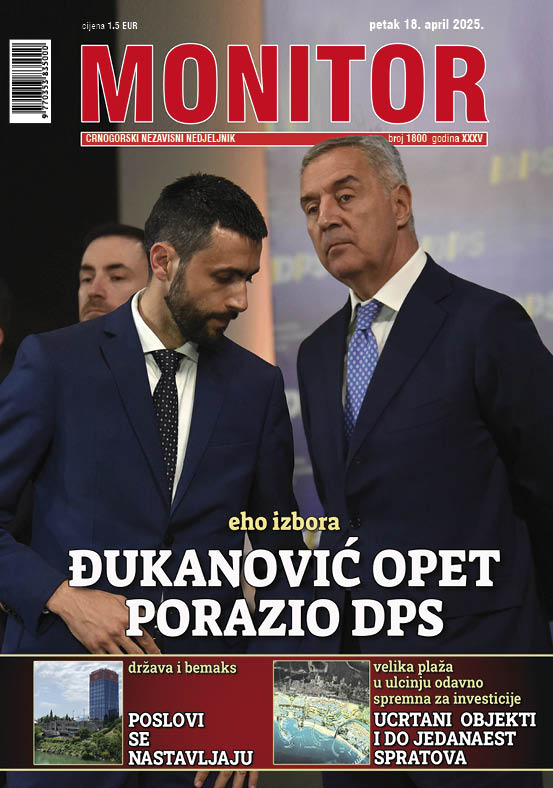

O Filipu Davidu, prosvjetitelju

IN MEMORIAM – MARIO VARGAS LJOSA: Božanski talentovani pripovjedač

SAFET SIJARIĆ “LJUBAV NA MILJACKI”: Roman o ljubavi koja prkosi smrti i pamćenju koje pobjeđuje zaborav
Izdvajamo
-
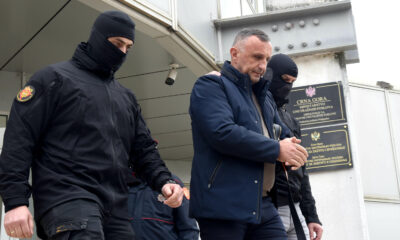
 DRUŠTVO3 sedmice
DRUŠTVO3 sedmiceNOVA HAPŠENJA ZBOG ŠVERCA CIGARETA: Pao i drugi vlasnik Tehnomaxa
-

 IN ENGLISH1 sedmica
IN ENGLISH1 sedmicaTWILIGHT OF MONTENEGRIN INTERESTS IN AMERICA: Prayer Breakfast Instead of Real Diplomacy
-

 IN ENGLISH1 sedmica
IN ENGLISH1 sedmicaGovernment Summons Ambassadors for Consultations and Instructions: A Foreign Policy Tightrope
-

 Izdvojeno3 sedmice
Izdvojeno3 sedmiceVLADA ZVALA AMBASADORE NA RAPORT I INSTRUKCIJE: (Ne)sluh za vanjsku politiku
-
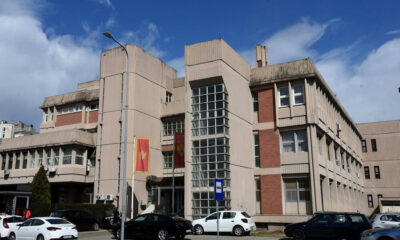
 FOKUS2 sedmice
FOKUS2 sedmiceZARADE U PRAVOSUĐU: Vrh i preko četiri hiljade, ostali duplo manje
-

 INTERVJU3 sedmice
INTERVJU3 sedmiceDALIBORKA ULJAREVIĆ, CENTAR ZA GRAĐANSKO OBRAZOVANJE: Nerazminirano polje
-

 DRUŠTVO2 sedmice
DRUŠTVO2 sedmiceMUKE TRETMANA OTPADNIH VODA: Projekti koje prate predrasude i loša iskustva
-
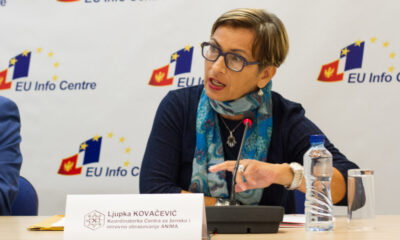
 INTERVJU2 sedmice
INTERVJU2 sedmiceLJUPKA KOVAČEVIĆ, ANIMA: Laž koja funkcioniše






